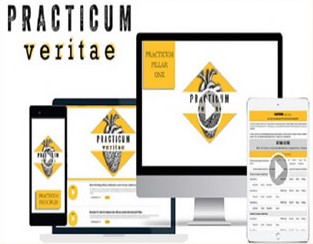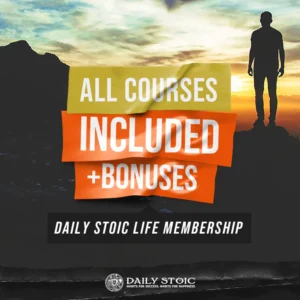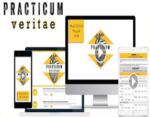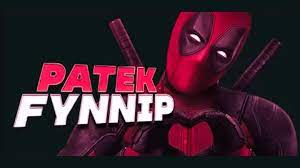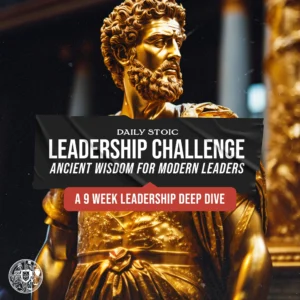My name’s John Romaniello. I’m a writer, coach, tattoo collector, and the creator of Practicum Veritae (about which I shall tell you in mere moments). Format File: [42 MP4 + 31 PDF + 8 DOC… File Size: 4.09 GB
John Romaniello – Practicum Veritae
If any of the following describe you…
You want to use writing to form a deep, lasting connection with your audience, but don’t know how…
You write all the time, but you have no idea if you’re getting any better…
You know you have something to say, but you can’t quite capture it in writing…
You feel like your writing is “stiff” or boring…
…you are in exactly the right place.
On the other hand…
If those don’t describe you…
…if even 1% of you thinks writing isn’t a huge advantage…
Then you are definitely where you need to be, because it’s even more important for us to talk.
Best for all concerned if you sit down, strap in, and put on a helmet—so we don’t make a mess when I blow your fucking mind.
First thing’s first. Introductions, and all that.
So. Hi there.
My name’s John Romaniello. I’m a writer, coach, tattoo collector, and the creator of Practicum Veritae (about which I shall tell you in mere moments).
john romaniello platypus
If you don’t know my work and want me to check a few credibility boxes for ya, I’ve got that whole “New York Times bestselling author and 7-figure entrepreneur” thing going on.
Should you find yourself impressed by sort of thing, awesome.
If not, my mom’s proud of me, and I’ve got this fancy stuffed platypus, so I’m set.
More than anything else, I’m a world-class brooder with a penchant for words, and I’m about to radically shift your understanding of writing.
But I’m also a pretty savvy copywriter…so before I wax rhapsodic about my love of the craft:
Gimme just 60 seconds to contextualize and show you why—despite living in the age of Instagram and YouTube—writing is still the most impactful skill you can learn.
Cool? Cool.
LET’S START WITH A FUN FACT:
A recent survey showed that in 2017, 86% of all interpersonal communication was written.
Between texts, emails, and DMs, most of us churn out more words per year than professional writers did 20 years ago.
And that doesn’t even include actual content.
BUT if the drivel plastered all across the Internet is any indication, we’ve got a problem.
Despite our increasing reliance on writing for everyday communication, people are, paradoxically, getting worse at it.
To see why this is such an issue, you need to understand something first.
Good writing, INSTANTLY captures attention.
Every time. (It’s science.)
Just as the human brain intrinsically recognizes and appreciates physical beauty, visual symmetry, or sonic melody…
…well-written words move through us in ways few things do.
So while you may not be going around actively looking for great writing…
…when you read something fantastic, you immediately know it.
And without even realizing it, you’re hooked.
One word brings you to the next word. And the next. And the next.
Before you know it, you’re halfway down the page, absorbed in what you’re reading, eager to see how it ends.
And after? You want to engage.
You’re more likely to comment on it.
More likely to share it.
More likely to remember it.
Good writing isn’t just easy to read. It’s compelling. Persuasive. Influential. Memorable.
Get immediately download John Romaniello – Practicum Veritae
It captures attention. It inspires action—and interaction.
And THAT is the difference maker.
The Uncomfortable Truth: Content isn’t enough to set you apart.
Look, you have to create content. And it needs to be good. What you put out in the world needs to be cogent, helpful, and effective.
But guess what? That’s not unique. Every one of your competitors can do that.
Precious little of what you teach is unique—and with so many voices clamoring for attention, it’s easy to get lost in the crowd…
…but if you’re going to achieve real success and have lasting impact, you NEED to be heard above the din.
And when it comes to standing out, fostering connection, and creating emotional response, nothing—and I mean nothing—can match writing.
Because writing is so much more than a means of conveying information.
It’s how you sell.
It’s how you teach.
It’s how you connect.
It’s how you move people to action.
If you’re not writing, you’re missing a tremendous opportunity to build a real, deep, lasting connection with anyone, from your customers to your crush.
And if you’re not actively trying to improve your writing, you’re going to keep missing those opportunities.
…and all the ones that come after.
Which is why I’ve developed systems to do exactly that, helping my clients make incredible changes in every area you can imagine.
As any of them will tell you, when you add good writing to the mix, the effect it has on your business, your brand, and your life is absolute.
“It was invaluable to learn how to spread my message
in a way more people will actually hear.”
This has given me such excitement to take my writing from 80% to 100%, especially now that I see how taking that extra step can make all the difference.
It was invaluable to learn how to use my writing specifically to grow my business, but more importantly—to spread my message and mission in a way more people will actually hear.”
—Amanda Bucci
Business Coach & Social Media Expert
amanda bucci john romaniello
Of course, with writing being so important (and undeniably effective), you’d think more people would focus on it.
But, they don’t.
As to WHY…
It’s simple.
You Don’t Know
What You Don’t Know
In the main, people don’t focus on writing because they don’t know what to focus on.
There is so much that people don’t know, and so much they don’t know they don’t know.
If you’re like most people who struggle, you might have that same issue.
You don’t know how to make their writing better because you don’t really know how to define “good” writing.
So you don’t know if and when you happen to write something “good,” or how to make it better.
Resultant of that, they have no what of knowing if they’re improving.
So even if you did know the specific aspects to focus on, if you did happen to improve in some way, you’d have no real way to determining what worked and what didn’t.
In short, you’re stumbling around blind.
That’s okay. So are a lot of people; I’m here to shine light on it.
Let’s make this a simple as possible.
If you’re gonna write well, you need three things:
a clear voice
a defined process
a structured method for assessment
Let’s start with voice.
In the simplest terms, your voice “sounds” like you.
The best compliment any writer can receive is, “I love reading your work. It always pulls me in. I feel like you’re talking right to me.”
That is voice.
Voice is what makes writing great.
If writing were just putting words down on paper in a sequence that made understanding the information possible, there’d be no art; just lists of facts.
When you truly learn how to convey your truth in a beautiful and impactful way, everything changes, from your personal relationships to the way people react to you in a professional setting.
Your writing Voice—the truest expression of who you are, put down on paper—is one of the most unique things about you.
So, regardless of what you plan to do with your writing, developing your voice is essential.
But. you probably knew that.
Now, here’s the part most people don’t know…
If there’s one thing just as important as your writing Voice, it’s your writing Process.
As much as the brooding wordsmith in me loves to focus on the fulfilling nature of the craft, there’s more to this than the artistry of it all.
Because while cultivating aptitude accessing your voice is a necessary step for any creative, it’s just as important is to develop proficiency around your practice.
The best writers aren’t just able to write something amazing; they know how they did it, and how to do it again.
For them, writing is both art and science—but it is first and foremost an act of (literal) creation: it requires you to produce something.
You have to actually get words on the page. Moreover, you have to be able to do it consistently.
And so the most effective and successful writers inhabit the “overlap,” understanding that art and science share something vital: a process.
That’s the key.
Without some type of process, execution is erratic, production is unpredictable, and creation is haphazard.
With a process, everything changes…
✍_x0001F3FB_ You understand your ebbs and flows, and how to leverage them to write more effectively.
✍_x0001F3FB_You know when you’re most creative vs. most productive (and why the difference matters).
✍_x0001F3FB_ You know exactly which tools make the words flow the fastest.
✍_x0001F3FB_ You can differentiate between feeling unproductive and having a creative block.
✍_x0001F3FB_ You have proven strategies to amplify your output, and data to support them.
Above all, a structured, effective process makes you consistent.
You get words on the page: better words, more often, and with greater ease.
A defined writing Voice lets you express your truth;
a defined writing Process lets you do it at will.
The two are equally important. Vital.
Separate—but inseparable.
Here’s how you focus on developing both.
Historically, you were left to your own devices. Finding your Voice was something you did through experience: trial and error, copying those who came before you, and thousands upon thousands of hours putting words on the page.
But there’s never been any thought given to creating your own process…which makes finding your voice harder.
With a process, not only can you get those words written in far less time, you can also take control of your development, allowing you to discover and hone your voice in a more directed way.
This is the exact thing I do with all of my mentorship clients. It’s the kind of thing I learned over the course of years in school.
But beyond working one-on-one, I’ve never found a great resource to help them create their process; to find what works for them; to put together a general practice to get better, faster.
(Obviously, you know what’s coming next because you definitely scrolled down
to the bottom of the page pretty much as soon as you got here and saw the images.
But for the sake of making the effort of writing this page feel
somewhat more justified, go ahead and pretend this is a big reveal.)
AHEM.
So, naturally, I went ahead and created that very thing.
BEHOLD:
Laudant Lessons for the Directed Development of a Veridical Voice & Perseverant Process
A Practicum is an intentional practice, course of study, or Process.
Veritae refers to capturing candid realism, or truth. In the context of writing, the embodiment of your truth is your Voice.
Taken together, Practicum Veritae means, “the practice of recording truth.”
And that’s our goal here.
Whether you’re looking to start writing, improve your writing, or build new skills to enhance your communication, Practicum Veritae sets your feet to the right path.
Following the lessons plans and using the tools gives you the precise, step-by-step plan to augment your skill with the written word and build a sustainable writing habit…
…translating to greater communicative acumen personally, professionally, and philosophically.
Keep in mind…
Your writing Voice is the truth sitting at the center of your being.
Accessing it is a challenge, to say the least. Writing beautiful Truth is rarely easy—but it can be made less difficult.
Having a Process makes accessing it both easier and simpler, all in the way that works best for you.
Engineered to help you discover and develop voice while constructing a personalized writing practice, this the one course that gives you BOTH.
Through directed writing (alongside a group of fellow wordsmiths), Practicum Veritae delivers an intentional, personalized, accessible practice for creating well-written, meaningful, resonant content.
Again and again and again.
That’s a skill that helps you to achieve any goal you set for yourself, whether personal or professional.
Writing unlocks the potential for all of it.
A great example of this is Joel Marion, one of the most successful entrepreneurs I know—who’s accomplished everything from creating a hugely impactful personal brand to writing a book to founding a 9-figure company.
Check out Joel’s view on writing…
There’s no one more capable of helping you refine your writing into the ultimate manifestation tool for your business and your life
In 2019, writing is the number one form of communication by leaps and bounds, with nothing else even close.
The right words can attract relationships, wealth, fulfillment, customers, new business; you name it.
Because when it comes to learning the art of putting words to paper to achieve your goals—whatever they may be—I can’t think of anyone in the same league as John Romaniello.
His course puts his skills and insights in one place, at an insane value.
A comprehensive, masterfully constructed approach to learning technique while getting deep with the craft, Practicum Veritae is an absolute no-brainer for anyone who wants success.
John is a master wordsmith, and there’s no one more capable of helping you find your unique voice—and refining it into the ultimate manifestation tool for your business and your life.
—Joel Marion
$600M+ in sales using words
Co-Founder of BioTrust Nutrition
Practicum Veritae is about more than just improving your writing; it’s about being intentional in your development as a writer.
Without question, you’ll start improving from the very first day.
You’ll learn techniques and the mechanical aspects.
You’ll enhance your vocabulary, learn to construct powerful sentences, and how to structure your content in a way to arrest attention, immediately.
From the first sentence to the final period, you’ll be able to grab your readers and hold their attention as you bring them all the way down the page.
But being a good writer isn’t just knowing how to write a catchy headline, where the commas go, or when to cut an extraneous adverb.
Improvement takes more than just figuring out your weaknesses and picking up some tools to address them.
It’s also about knowing yourself well enough to allow for consistent writing and produce great material…
…and having a structured what to determine what does (and doesn’t) constitutes great material, as quickly as possible.
Whether in the idea stage or once it’s one the page, knowing the potential for something to be impactful is a skill you cultivate through constant assessment.
For rapid progress on all fronts, Practicum Veritae take a bifurcated approach: you focus on assessment and improvement alternately, improving both concurrently.
This results in something much greater than a simple feedback loop: a self-perpetuated and accelerative cycle.
Let’s take a look at the tools you’ll use to focus on each of these pieces independently and collectively…
Gadgets & Gizmos Aplenty: Instructional Implements + Artistic Accoutrements
(or, course materials, if you wanna be lame about it)
PRACTICUM PROMPTS
The core of the Practicum is a series of daily writing assignments, delivered in the form of Prompts.
The vehicle for putting in the reps of daily writing, each Prompt is both an assignment and a lesson.
Designed and curated with intentionality, through this 30-day writing practice, you’ll be writing from different perspectives for different purposes, with different structures.
In a month’s time, you’ll produce 30 raw samples while stretching your creativity, building core writing skills, and uncovering your Voice.
The following month, you’ll edit each piece, resulting in new skills, a greater understanding of the unsung aspect of the craft.
PRACTICUM PRINCIPLES
Five powerful and actionable strategies for approaching the craft, the Practicum Principles for Unbridled Learning are accessible the moment you begin the course.
Covering everything from restructuring daily habits to reframing perception, these 5 video lessons give you an immediate jump-start to improving your wordcraft.
PRACTICUM PILLARS
These four video lessons go deep, outlining the most impactful practices I use every time I write.
Released weekly, each new lesson has clear instructions for implementation, allowing you to build and stack these skills progressively.
From assessment strategies to concrete editing techniques, nothing will develop your Voice and Process faster or more effectively than the Practicum Pillars.
PRACTICUM PERSONAL PROGRAMMING
A comprehensive system for tracking and self-assessment. From your time spent writing to your word count, I’ll give you an understanding of how you’re creating.
From there, you’ll learn how to improve that, and how to interpret and apply everything you’re recording to make your writing better and your sessions more productive.
PRACTICUM POSSE
Overseen personally by me, the Practicum Posse is your Fellowship of the Ring, your Avengers, your X-Men, your D&D adventuring party: a coterie of wordsmiths.
Accessed through the Practicum course platform, members of the Posse work independently to improve their individual skills…
…but also contribute to a greater collective, providing inspiration, feedback, and accountability.
Practicum Veritae shows you how to write and connect so you’ll be the coach people want to buy, over and over.
Through my books and my company, the Personal Trainer Development Center, I’ve spent the better part of the last decade helping people build the skills to be successful coaches.
Sometimes it’s better programming or assessing strategies. Other times it’s business and marketing.
But the one thing EVERYONE needs to improve is communication. Because communication means connection.
We all need to connect to the people we’re trying to serve, whether we’re trying to educate them, entertain them, or coach them.
And when it comes to connection, writing is the most effective, reliable, and leveragable way to do that.
Unfortunately, it’s an area I see a LOT of coaches neglect, focusing instead on certifications and business seminars.
But all the knowledge in the world won’t matter if you can’t communicate it to your audience in an understandable and meaningful way. And business skills aren’t nearly as useful if you the way you teach things isn’t unique to you.
Which is why I’m so psyched about John Romaniello’s Practicum Veritae: it shows you how to do both, breaking down the skills and process in a way from which anyone can benefit, regardless of starting point.
I feel so strongly about this, I personally bought the course the day it came out.
John’s ability to connect through writing is what’s made him successful. He touched on this in an interview we did for my first book, saying, “people don’t buy coaching, they buy coaches.”
Practicum Veritae shows you how to write and connect so you’ll be the sort of coach people want to buy, over and over.
—Jon Goodman
Founder + Creator,
the PTDC
& the Online Trainer Academy
*yoink* special release price: $555
Wanna space it out? No problem. Click here to grab it for 4 payments of $181.
The Practicum Protocol
I’ve alluded to this a few times now, but let’s put it in plain language.
While Practicum Veritae teaches you to be a better writer, that’s secondary goal.
The primary goal is to give you both a philosophical and tactical understanding of what being a better writer actually means…
…and giving you the tools to achieve that, long-term.
You’re learning, yes. And you’re definitely getting better.
But beyond that—
—as you go through Practicum Veritae, you’re learning how to learn.
Through prioritizing the five most immutable aspects of the writing (and learning) process, we create perpetual application.
I. PREPARATION
They say preparation is the key to success. And I’ve found that to be true. To be provide the absolute best experience and give you the greatest advantage, I’ve taken care of the preparation for you.
First, there are the Practicum Principles for Unbridled Learning. Five powerful and actionable strategies for approaching the craft, these are accessible the moment you begin the Practicum.
Covering everything from restructuring daily habits to reframing perception, these 5 video lessons give you an immediate jump-start to improving your literary acumen.
In combination with structured templates for writing and assessment, as well as some recommendations for tools and resources, the Practicum Principles have you set and ready to write.
II. INSTRUCTION
The Practicum Pillars form the basis of your writing instruction.
In these four video lessons, I go deep, outlining the most impactful practices I use every time I write.
Each of these lessons covers an integral piece of the Craft:
Objectivity
(and its value in selecting what to write)
Building + Creating Your Process
(and how personal data collection dramatically improves productivity)
Writing in Your Voice
(and how to practice creating memorable and impactful sentences)
How to Edit
(including assessment, grading, review, and revision)
Released weekly, each new lesson has clear instructions for implementation, allowing you to build and stack these skills progressively.
From assessment strategies to concrete editing techniques, nothing will develop your Voice and Process faster or more effectively than the Practicum Pillars.
III. CREATION
The core of the Practicum is a carefully assembled series daily writing assignments, delivered in the form of Prompts.
Every day for 30 days, you receive a new prompt. This assignment is to be completed that day, and—ideally—posted for accountability and feedback.
Now, here’s your first lesson: words matter. And specific words matter most.
While this is very challenging, this is not a writing “challenge.”
A challenge is something you can fail. That’s not the case here.
This is a practice—and we’re using both the verb and noun form of that word.
You’ll be performing the action, the verb: practicing writing, with the goal of improvement. But you’re also building the practice of doing this daily. Our aim here is both: greasing the groove and getting better; but also establishing the habit.
Beyond serving as a vehicle develop the habit of daily writing, each Prompt is both an assignment and a lesson.
Designed and curated with intentionality, the assignments vary in form and function.
So in addition to being fun and interesting, each prompt teaches something new.
Because you’ll be writing from different perspectives for different purposes, with different structures, and in different tones, you’ll always be using different tools.
This type of broad variation drastically increases the rate at which you improve your technical skills.
But, there’s an even more important consideration: with consistent variation in topics, styles, forms, and narrative intention, the only constant is you.
Your approach; your perspective; your experiences.
Your voice.
John’s process for helping people create impactful content with their own style is unlike anything I’ve ever seen.
“When I first met John, I didn’t have the slightest idea how to write effectively.
I didn’t know what to say. Or how to say it. I didn’t have my own voice. I didn’t have a process. And I had no clue where to start with any of it.
Whenever I sat down to write, I’d just wing it, hoping something would hit home.
The worst part was, I had no idea if I was getting better. John’s guidance and mentorship changed all that.
Mere months after going through this course, colleagues offered to pay me (rather handsomely) to write their content and copy.
Since then, I’ve sold multiple millions worth of products and services, written an Amazon Bestseller on fitness marketing (the title of which John helped me nail), and traveled the country speaking at conferences on copywriting and marketing.
John’s process for helping people create impactful content with their own style, and their own business in mind, is unlike anything I’ve ever seen.
So if you’re a business owner, a coach, or someone who wants to build a personal brand, you need Practicum Veritae in your life.
I’m so glad John finally put all this gold into one place.”
—Joey Percia, Speaker + Copywriter,
Amazon Bestselling Author of
Why Do You Hate Money?
IV. ASSESSMENT
As I said earlier, one of the largest issues keeping people from writing goes beyond the difficulty of the act: they avoid it because they have no way of knowing what’s good or not.
Get immediately download John Romaniello – Practicum Veritae
To that, one of the most valuable aspects of Practicum Veritae is the toolset for assessment.
Following the Practicum means 30 writing sessions—which provides 30 opportunities to assess creation.
Again, this is a truly comprehensive system for tracking, self-assessment, and improvement.
Every time you sit down to write, you’ll fill out a pre-assessment form before you set pen to page. You’ll be recording data about your overall state, your intended approach, and your prediction for difficulty.
When you finish each assignment, you’ll go through an equally beneficial post-writing assessment.
Anything that could influence your writing session is taken into account: the environment, the physical and mental practices you used, even whether you had coffee.
The assessment protocol records time spent writing, your word count, feel, level of productivity.
You have an expertly structured approach to understand how you’re creating…
…and how to interpret and apply that information…
In short: everything you need to develop your personal writing Process—making your writing better and your sessions more productive.
V. REFINEMENT
Hemingway said, the first draft of anything is shit. For most, this also applies to final draft—because most people don’t know how to edit. If they bother to edit at all.
Part of becoming an effective writer is understanding that writing is only half the job; before anything can be considered ready to stand before the eyes of those for whom it was intended, it needs to go through some editorial processes.
Great writing is good writing without the noise. Practicum

